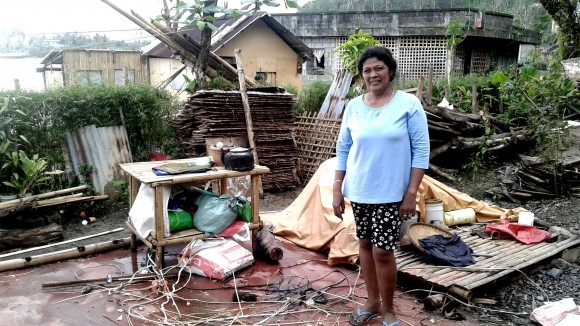January 2017 began with much of the Philippines suffering the destructive aftermath of Typhoon Nock-Ten. It hit the islands on Christmas Day and devastated communities in its path. But the year also opened with one of the most unique Start Fund responses to date. After the fund received its 134th alert, two projects were selected for funding - one of which was collaboratively implemented by three of our members. The alert also involved one of the first real-life tests of a 'collaborative roster', set up through the Start Network under the Disaster and Emergencies Preparedness Programme's Transforming Surge Capacity project. This Start Fund response was a unique example of Start Network's ability to enable localised and collaborative humanitarian action at different levels, and to bring these initiatives together under the right circumstances.
ACTED, one of our members involved in the response, provided a view from the ground through the story of Analyn, one of the people affected by Nock-Ten and subsequently reached through the Start Fund.
Typhoon Nock-ten (also known as Nina) struck the Philippines on Christmas Day 2016, particularly the eastern island province of Catanduanes. Some 400,000 houses were either completely destroyed or badly damaged. ACTED, in consortium with Action Against Hunger and Handicap International, is providing an integrated emergency response, bringing water, hygiene, sanitation and assistance with shelter to more than 3,200 familie, through the distribution of hygiene and shelter repair kits. Some 1,400 shelter repair kits are being distributed by the teams, while 140 workers were hired to support the repairs. This programme enables people to work for the community at the same time as earning their own incomes. By the end of January, 136 houses had already been rebuilt, with many more still under construction. This intervention took place with support from the Start Fund.
Analyn’s story
Analyn is a strong woman. A widow, she single-handedly takes care of her four children. Her eldest, Malaya, was born 25 years ago with particular needs and Analyn has been taking care of her ever since, which leaves her with little opportunity to find employment. The only source of income in the family is through her other daughter, who works as a waitress. They are residents of the Bato municipality, where Nock-Ten first made landfall. The typhoon tore apart Analyn’s house, which was made of bamboo and roofed with the nipa palm leaves, and left in its wake only a concrete slab to remind the family of their former home.
Working together for Analyn
ACTED responded to Analyn’s dire need for shelter by providing shelter repair kits. She received tarpaulins, tie wires and all the necessary tools to rebuild her home. Barangay’s village authorities and ACTED teams went a step further to support Analyn and other vulnerable families who could not repair their houses alone, by hiring workers to help them carry out the shelter repair works.
In Batalay village, where Analyn lives, the workers were mobilised not only to repair the damaged houses, but to help four families completely rebuild their destroyed homes. Under the coordination of Domingo Mendez, Barangay Captain (a local elected official), ACTED’s workers and Barangay officials helped rebuild the houses of four single-headed no-income households, including Analyn’s. Some of the materials needed to rebuild the houses were expensive and hard to find, but Barangay officials, carpenters, the house owners, and the community worked together to acquire the necessary equipment.
Out of the 67 local families who received shelter kits, four are also supported by the hired workers. Mr. Mendez explains: “The community supports us as they know that those four families cannot help themselves and need help. Once we are done with those four houses, we will do ‘’Bayanihan’’ (a volunteering day in the village) and help others as well. It is important to help one another."
In the meantime, efforts continue to purchase the remaining materials needed for the repairs; while one of the priorities is to identify a relocation site, as the village’s current location is prone to floods and landslides.
ACTED also provided training to the workers and other willing inhabitants on “build back safer” techniques, in order to increase the new houses’ resilience against the strong winds and rain caused by the area's recurring typhoons.
Read the story on the ACTED website.
Read more about the Start Fund
Read more about the Transforming Surge Capacity project
Read about the Disasters & Emergencies Preparedness Programme

